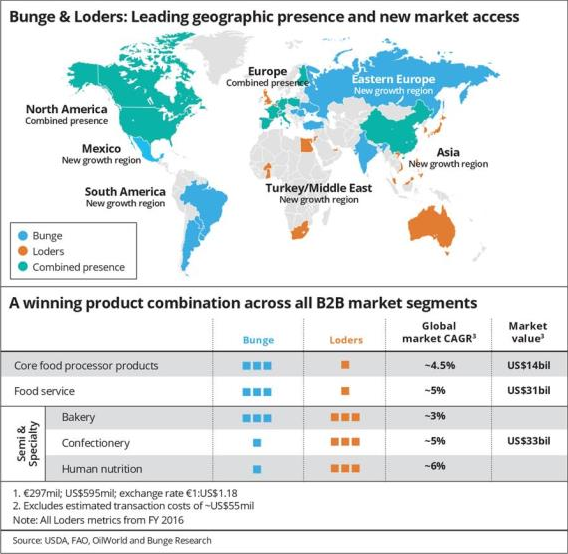Vital role: Lee says IOI will continue to play a vital role in Loders post-transaction given its expertise in palm oil sourcing and
business experience in the fast growing Asia Pacific region.
IOI to reduce debts while it’s a game changer for Bunge in edible oils
Salient points
> IOI Loders-Bunge in strategic partnership
> Loders to ride on Bunge’s extensive global market network
> Game changer for Bunge in edible oil blends business
A “win-win” strategic partnership is in the making between two corporate giants, plantation group IOI Corp Bhd and US-based global agribusiness and food company Bunge Ltd.
This week, IOI announced the proposed disposal of a 70% controlling stake in IOI’s Netherlands-based palm oil refinery IOI Loders Croklaan Group BV for RM3.94bil to Bunge while retaining a 30% stake in Loders. Loders is one of Europe’s leading global suppliers of specialty oils and fats to the processed food industry. IOI bought this business from Unilever back in November 2002 for RM814mil.
Since then, Loders has grown from three to seven processing plants in North America, Europe and Asia. It posted US$1.6bil in revenue in 2016s and processes 1.6 million tonnes of raw material in seven locations in North America, Europe and Malaysia. Two facilities in China and Ghana also are nearing completion.
So, what is the rationale behind IOI’s divestment in Loders, which has steadily contributed 10% to 15% to the IOI Group’s profits in the past five years?
According to IOI Corp executive director and CEO Datuk Lee Yeow Chor, post-transaction IOI will continue to play a vital role in Loders given its expertise in palm oil sourcing and business experience in the fast growing Asia-Pacific region. IOI, via its 30% stake in Loders, will still be involved in key management decisions taken by Loders as it will have two representatives on Loders’ five-member board of directors. It will also remain a major supplier of sustainably produced palm oil and palm products to Loders.

New investments
Of the total sales proceeds from Loders’ 70% stake disposal, Lee tells StarBizWeek that IOI will reserve 30% or RM1.172bil for future investments and working capital requirement. Of the remaining proceeds, 50% will be utilised for repayment of borrowings, 20% dividend and disposal expenses about 0.25%.
“We plan to make further new investments in our core business areas using part of the proceeds of the disposal,” says Lee, who adds that there is a possible future invesments in plantation.
To support its growth expansion plan, IOI Group is open to acquire more plantation land in Malaysia or Indonesia. To date, IOI Group has about 207,000 ha plantation land bank in Malaysia and Indonesia with the balance of unplanted area about 9,000 ha. The group is planning to complete the planting of remaining 9,000 ha in Indonesia over the next two to three years with a targeted replanting about 6,000-9,000 ha per year.
At the same time, IOI holds 31.7% stake in an associate company Bumitama Agri Ltd, which has a planted area of about 120,000 ha in Indonesia.
Asked on the possible future earnings dilution to IOI Group due to its smaller stake in Loders, Lee points out that it will depend on the growth of IOI group’s present plantation and oleochemical businesses “where there have been new plantings and recent acquisition of new plants as well as plant expansion respectively.”
“We are also planning to make further new investment in our core business areas using part to the proceeds from the disposal,” explains Lee.
The disposal of Loders is expected to be completed by the fourth quarter of 2018, and is not expected to have any material impact on the earnings of the IOI group for June 30, 2017.
Meanwhile, Bunge CEO Soren W. Schroder has described the partnership with IOI Loders as a “natural match.” The deal would be a game changer by raising Bunge’s earnings from edible oil blends which tend to have higher and steadier profit margins than trading bulk commodities. Bunge last year handled seven million tonnes of edible oil products while Loders’ oil volume totalled 1.6 million tonnes. In a recent analysts briefing in New York, he points out that Loders acquisition accelerates the growth of Bunge value-added business and is immediately cash accretive.
The cost synergies are significant at US$45mil per year by year three and we estimate revenue synergies to be about US$35mil in the near term.”
Schroder said Loders’ standalone earnings before income, tax, depreciation and amortisation (EBITDA) is projected to grow at low double digits per year over the next three years, and when integrated with Bunge will nearly double the earnings of the company’s oils franchise.
“The combined business will focus intensely on customer solutions and clear commitments to sustainability,” he said. In July, Bunge has identified growth in edible oils as a priority when it announced a US$450mil cost-cutting and competitiveness programme.
The company entered into a US$900mil loan agreement with Sumitomo Mitsui Banking Corporation, which it may use to finance the Loders purchase. Schroder said that while Bunge would borrow to help finance the acquisition, which is expected to close in 12 months, it “will pay itself back in reasonably short order”.
Synergies creation
According to UOBKayHian, IOI is emulating the synergies created from the partnership between Wilmar Group and another global agribusiness player Archer Daniels Midland. By riding on Bunge’s global presence, Loders would be tapping into Bunge’s presence in other regions such as South America and South Asia which IOI currently does not have a footprint which will help to increase sales in Loders. IOI will also be getting better access to the softoils market by partnering Bunge, says the research unit.
The research unit said in its report that the global demand for blended oils is increasing. Thus the exposure to other softoil markets will enhance Loders competitive advantage, it added. UOB Kay Hian also points out that post-disposal, IOI net gearing ratio is expected to reduce to 0.34 times from 0.78 times as of end-June 2017.
Paring down of foreign currency borrowings will reduce IOI’s exposure to US dollar fluctuation. A potential special dividend is also in the offing with the IOI management planning to utilise 20% of the proceeds as special dividend, and this will translate to dividend per share of 12.6 sen or yield of 2.8%. On potential earnings dilutions, UOBKayHian understands that without the partnership with Bunge, Loders sales are expected to grow at single-digit year-on-year (y-o-y) in the coming years. But through the partnership, Loders sales are expected to grow at double digit y-o-y, supported by the cross selling and expansion to new markets.
Moreover, the partnership is expected to create cost synergy through shared infrastructure and supply-chain optimisation. According to Bunge, the partnership could create total synergy of US$80mil in 2020, of which US$45mil will be in cost and US$35mil in revenue.
“However, the disposal could lead to earnings dilution to IOI in the earlier years due to its smaller stake (30%) in Loders,” adds the research unit.
CIMB Research also views the disposal of Loders’ controlling stake to Bunge as a good deal for IOI. IOI estimated that it could book a one-off gain of RM2.5bil or 39.8 sen per share from the disposal.
“This represents upside of 221% to our FY2016-2019 net profit estimates for IOI Corp. Post the disposal, it will cease to consolidate earnings from Loders and only book in 30% of Loders earnings as associates. However, the lower earnings contribution from Loderswill be mostly offset by interest savings from repayment of debts and potential synergies following the sale.
“We estimate the potential dilution impact on earnings from the sale to be around 2%,” CIMB adds.
The research unit is also maintaining its earnings per share estimates for IOI Corp pending the completion of the disposal. “However, we are raising our SOP value to input the higher market valuations for Loders and reducing the valuations for its other downstream assets (refining and oleochemicals) to 1.8 times P/BV.
CIMB is maintaining a “hold” on IOI as “we see share price support from its rich assets and share buy back exercise. The key upside or downside risks are higher or lower crude palm oil and the output.”
